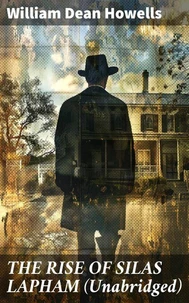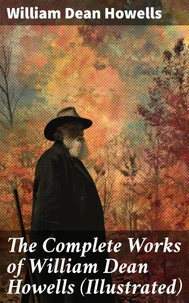American Literary Centers (from Literature and Life)
Par :Formats :
Disponible dans votre compte client Decitre ou Furet du Nord dès validation de votre commande. Le format ePub est :
- Compatible avec une lecture sur My Vivlio (smartphone, tablette, ordinateur)
- Compatible avec une lecture sur liseuses Vivlio
- Pour les liseuses autres que Vivlio, vous devez utiliser le logiciel Adobe Digital Edition. Non compatible avec la lecture sur les liseuses Kindle, Remarkable et Sony
 , qui est-ce ?
, qui est-ce ?Notre partenaire de plateforme de lecture numérique où vous retrouverez l'ensemble de vos ebooks gratuitement
Pour en savoir plus sur nos ebooks, consultez notre aide en ligne ici
- Nombre de pages108
- FormatePub
- ISBN859-65--4736430-6
- EAN8596547364306
- Date de parution16/09/2022
- Protection num.Digital Watermarking
- Taille321 Ko
- Infos supplémentairesepub
- ÉditeurDIGICAT
Résumé
In "American Literary Centers, " part of his influential collection "Literature and Life, " William Dean Howells examines the pivotal hubs of American literary culture during the late 19th-century. Howells' prose is marked by clarity and meticulous observation, blending critical analysis with a rich historical context. He scrutinizes the sociocultural environments that nurtured literary production, particularly focusing on urban centers like Boston and New York.
Through this exploration, Howells delineates the interplay between regional identities and the broader national narrative, emphasizing the importance of place in shaping literary expression. William Dean Howells, often dubbed the "Dean of American Letters, " was a prominent novelist and literary critic whose career coincided with the American literary renaissance. His extensive background in both literature and journalism, coupled with his friendships with literary giants like Mark Twain and Henry James, informed his insights into the dynamics of the literary scene.
Howells championed realism in literature, positioning himself as a voice for the emerging American narrative through the examination of societal themes. This scholarly work is essential for anyone interested in the development of American literature, as it offers invaluable insights into the factors that shaped the literary canon. Howells' analysis not only illuminates the foundational literary centers but also encourages readers to reflect on how geography, community, and culture interact to inspire literary innovation.
Through this exploration, Howells delineates the interplay between regional identities and the broader national narrative, emphasizing the importance of place in shaping literary expression. William Dean Howells, often dubbed the "Dean of American Letters, " was a prominent novelist and literary critic whose career coincided with the American literary renaissance. His extensive background in both literature and journalism, coupled with his friendships with literary giants like Mark Twain and Henry James, informed his insights into the dynamics of the literary scene.
Howells championed realism in literature, positioning himself as a voice for the emerging American narrative through the examination of societal themes. This scholarly work is essential for anyone interested in the development of American literature, as it offers invaluable insights into the factors that shaped the literary canon. Howells' analysis not only illuminates the foundational literary centers but also encourages readers to reflect on how geography, community, and culture interact to inspire literary innovation.
In "American Literary Centers, " part of his influential collection "Literature and Life, " William Dean Howells examines the pivotal hubs of American literary culture during the late 19th-century. Howells' prose is marked by clarity and meticulous observation, blending critical analysis with a rich historical context. He scrutinizes the sociocultural environments that nurtured literary production, particularly focusing on urban centers like Boston and New York.
Through this exploration, Howells delineates the interplay between regional identities and the broader national narrative, emphasizing the importance of place in shaping literary expression. William Dean Howells, often dubbed the "Dean of American Letters, " was a prominent novelist and literary critic whose career coincided with the American literary renaissance. His extensive background in both literature and journalism, coupled with his friendships with literary giants like Mark Twain and Henry James, informed his insights into the dynamics of the literary scene.
Howells championed realism in literature, positioning himself as a voice for the emerging American narrative through the examination of societal themes. This scholarly work is essential for anyone interested in the development of American literature, as it offers invaluable insights into the factors that shaped the literary canon. Howells' analysis not only illuminates the foundational literary centers but also encourages readers to reflect on how geography, community, and culture interact to inspire literary innovation.
Through this exploration, Howells delineates the interplay between regional identities and the broader national narrative, emphasizing the importance of place in shaping literary expression. William Dean Howells, often dubbed the "Dean of American Letters, " was a prominent novelist and literary critic whose career coincided with the American literary renaissance. His extensive background in both literature and journalism, coupled with his friendships with literary giants like Mark Twain and Henry James, informed his insights into the dynamics of the literary scene.
Howells championed realism in literature, positioning himself as a voice for the emerging American narrative through the examination of societal themes. This scholarly work is essential for anyone interested in the development of American literature, as it offers invaluable insights into the factors that shaped the literary canon. Howells' analysis not only illuminates the foundational literary centers but also encourages readers to reflect on how geography, community, and culture interact to inspire literary innovation.






